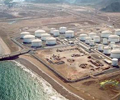

Oil product stockpiles at the UAE’s Port of Fujairah rose for a second consecutive week, largely driven by weakening gasoline demand East of Suez, which more than offset a draw in middle distillates.
The total inventories stood at 21.754 million barrels as of July 19, up 0.5% from a week earlier, according to data released July 20 by the Fujairah Oil Industry Zone, provided exclusively to S&P Global Platts.
That is still lower than the average of 22.811 million barrels seen in May and June, as well as the 26.326 million barrels averaged over June 2020, during the market crash due to the pandemic.
Stockpiles of light distillates, including gasoline, rose 6.8% in the week to a four-week high of 6.625 million barrels, the data showed.
Gasoline demand East of Suez has been pressured by the surge in COVID-19 infections attributed to the delta variant, which has forced lockdown measures in many Southeast Asian countries, as well as dampened social gatherings associated with the Eid al-Adha holidays in the Middle East and the Hajj pilgrimage in Saudi Arabia, according to market sources.
China, a key market, has also slashed its gasoline import volumes for July.
Stocks of heavy distillates and residues, including fuel oils for power generation and marine bunkers, climbed 0.4% on the week to 11.761 million barrels, a three-week high.
Fuel oil imports from Saudi Arabia this quarter have been less than expected, according to traders, and sales of LSFO at Fujairah dipped 3.6% on month in June.
Meanwhile, inventories of middle distillates such as jet fuel and gasoil fell 9.6% on the week to 3.368 million barrels, the lowest since April 26.
The pull in jet fuel had perhaps been presaged by Emirates Airline, which had said July 14 it expected “high passenger volumes” at Dubai International Airport over the July 16-17 weekend ahead of the Eid holiday.
Tighter Chinese gasoil exports in July also may have contributed to the draw.
Source: Platts